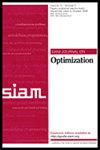Interpolation Conditions for Linear Operators and Applications to Performance Estimation Problems
IF 2.3
1区 数学
Q1 MATHEMATICS, APPLIED
引用次数: 0
Abstract
SIAM Journal on Optimization, Volume 34, Issue 3, Page 3033-3063, September 2024.Abstract. The performance estimation problem methodology makes it possible to determine the exact worst-case performance of an optimization method. In this work, we generalize this framework to first-order methods involving linear operators. This extension requires an explicit formulation of interpolation conditions for those linear operators. We consider the class of linear operators [math], where matrix [math] has bounded singular values, and the class of linear operators, where [math] is symmetric and has bounded eigenvalues. We describe interpolation conditions for these classes, i.e., necessary and sufficient conditions that, given a list of pairs [math], characterize the existence of a linear operator mapping [math] to [math] for all [math]. Using these conditions, we first identify the exact worst-case behavior of the gradient method applied to the composed objective [math], and observe that it always corresponds to [math] being a scaling operator. We then investigate the Chambolle–Pock method applied to [math], and improve the existing analysis to obtain a proof of the exact convergence rate of the primal-dual gap. In addition, we study how this method behaves on Lipschitz convex functions, and obtain a numerical convergence rate for the primal accuracy of the last iterate. We also show numerically that averaging iterates is beneficial in this setting.
线性算子的插值条件及其在性能估计问题中的应用
SIAM 优化期刊》,第 34 卷第 3 期,第 3033-3063 页,2024 年 9 月。 摘要性能估计问题方法可以确定优化方法的精确最坏情况性能。在这项工作中,我们将这一框架推广到涉及线性算子的一阶方法。这种扩展需要明确制定这些线性算子的插值条件。我们考虑了矩阵 [math] 具有有界奇异值的线性算子 [math] 类,以及 [math] 对称且具有有界特征值的线性算子类。我们描述了这些类的插值条件,即给定[math]对列表的必要条件和充分条件,这些条件描述了对于所有[math],映射[math]到[math]的线性算子的存在性。利用这些条件,我们首先确定了应用于组成目标 [math] 的梯度法的确切最坏情况行为,并观察到它总是对应于 [math] 是一个缩放算子。然后,我们研究了应用于[math]的 Chambolle-Pock 方法,并改进了现有的分析,得到了初等-二等差距的精确收敛率证明。此外,我们还研究了这种方法在 Lipschitz 凸函数上的表现,并获得了最后迭代的基元精度的数值收敛率。我们还从数值上证明了平均迭代在这种情况下是有益的。
本文章由计算机程序翻译,如有差异,请以英文原文为准。
求助全文
约1分钟内获得全文
求助全文
来源期刊

SIAM Journal on Optimization
数学-应用数学
CiteScore
5.30
自引率
9.70%
发文量
101
审稿时长
6-12 weeks
期刊介绍:
The SIAM Journal on Optimization contains research articles on the theory and practice of optimization. The areas addressed include linear and quadratic programming, convex programming, nonlinear programming, complementarity problems, stochastic optimization, combinatorial optimization, integer programming, and convex, nonsmooth and variational analysis. Contributions may emphasize optimization theory, algorithms, software, computational practice, applications, or the links between these subjects.
 求助内容:
求助内容: 应助结果提醒方式:
应助结果提醒方式:


